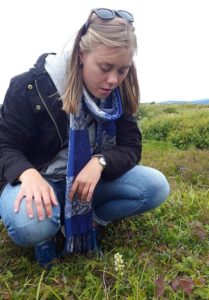My name is Silje, and I just recently graduated from the University of Bergen with a MSc in Biology. I was born and partially raised in Sweden, but lived most of my life in Bergen, Norway. I did my BSc at the Norwegian University of Life Sciences, and for both my BSc and MSc I chose the study direction “Biodiversity, evolution and ecology”. My main scientific interest is terrestrial ecology and ecosystem services, and how they are affected by climate change. In my master thesis I studied plant-pollinator mismatch in Ranunculus acris in an alpine area. I now work as a technician in the Ecology and Environmental Change Research Group at the University of Bergen, mainly on one of Vigdis’ projects called “FunCaB”: The role of Functional group interactions in mediating climate change impacts on the Carbon dynamics and Biodiversity of alpine ecosystems.
My scientific goals for the Plant Functional Trait Course on Svalbard is to learn about traits and learn how to do and use carbon flux measurements. As I currently know next to nothing about any of these topics, I suppose I will consider my goals met as long as I learn anything about both topics (is that setting the bar too low? 😅) Socially my goals are to get to know my fellow course participants, and learn about their studies and scientific interests.

I have friends and fellow students that have participated in courses on Svalbard in the past, which have made me eager to discover its wild landscapes and unique vegetation, so I will admit that I am incredibly excited about just coming to Svalbard and experience it for myself! Also: who wouldn’t be excited about getting the slight chance of seeing whales, walruses, rare polar birds and polar bears? From a more scientific perspective, I look forward to getting new knowledge and learning new skills, which is always exciting and extremely valuable. As a plant lover, I am also very excited about studying the flora of Svalbard up close!
As arctic areas are some of the places where climate change is most visible and present, I think the inhabitants of Svalbard will be very aware of the topic and the problems it is causing. Svalbard has been hitting many new records of high temperatures over the last years, and I think measurements like these speak for themselves. I expect that most people on Svalbard accept that the planet is indeed warming. However, coal mining has been a huge part of Svalbard history, and as burning of fossil fuels is one of the best known contributors to climate change, there might very well be some strong disagreements about this topic between inhabitants of Svalbard.
Of course there are thousands and thousands of people who do not believe in man made climate changes, including people in the Norwegian government, sadly. But I think many Norwegians, if not most, accept climate changes, and that they believe that human activities are the cause of it. Although I do feel that there is generally a high awareness about climate changes, I still think that many people do not (or does not want to) realise the actual potential consequences, and rich entitled Norwegians are rarely willing to give up their lifestyles to reduce their carbon footprint. One thing I have noticed that I am glad of is that it is now more common to talk about “climate change” as opposed to “global warming”, which is all I remember hearing of during primary school. It is important to make the public understand about all of the potential consequences of increased emissions to the atmosphere, and not just increasing temperatures. Maybe it will also be the death of my least favourite “dad joke”. In Bergen winters are normally very mild and wet, but in later years we have often had periods of uncommonly cold, dry weather during winter, and during such periods I don’t know how many times I have heard the joke (sometimes it was probably not even meant as a joke…) “and they talk about global warming – heheheh…” (Norwegians are very funny). Maybe this “joke” will slowly die with this change of focus.
